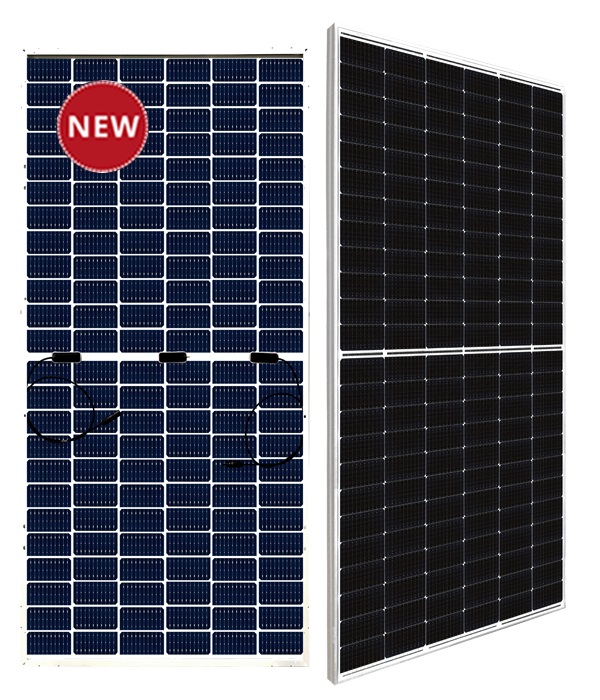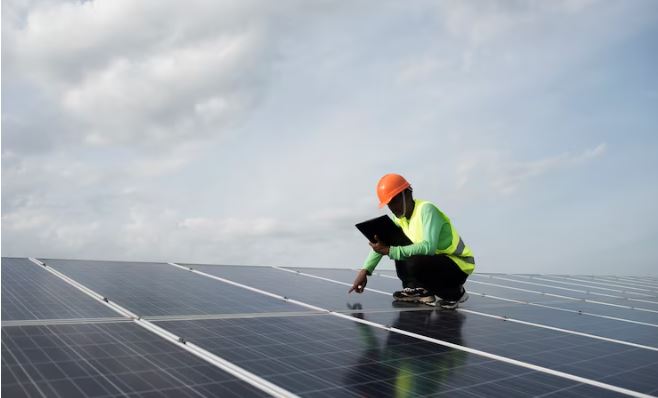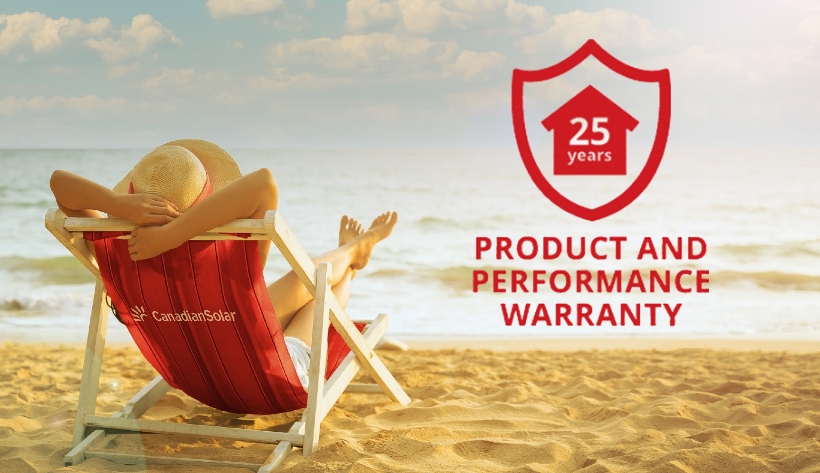Solar Panel ( How Solar Panel Works
A solar panel is an innovative device that converts sunlight into electricity by using photovoltaic (PV) cells. PV cells are made of materials that produce excited electrons when exposed to light. The electrons flow through a circuit and produce direct current (DC) electricity, which can be used to power various devices or be stored in batteries. Solar panels can be used for a wide variety of applications, such as homes, remote power systems, telecommunications equipment, and grid-connected systems that feed electricity into the utility network.
Solar Cell
Photovoltaic (PV) Cell
Photovoltaic (PV) cells, also known as solar cells, are devices that convert sunlight directly into electricity. The word “photovoltaic” comes from the combination of two terms: “photo,” which means light, and “voltaic,” which relates to electricity (named after Alessandro Volta, a pioneer in the study of electricity).
PV cells are the basic building blocks of solar panels, which are used to generate solar power. These cells are typically made of semiconductor materials, such as silicon. When sunlight strikes the surface of a PV cell, it excites electrons within the semiconductor material, generating an electric current. This process is known as the photovoltaic effect.
Excited Electrons
What is Excited Electrons
Excited electrons are electrons that have moved from their normal energy level (called the ground state) to a higher energy level (called the excited state). This can happen when the electrons absorb energy from photons, collisions, or heat. When the electrons return to a lower energy level, they release energy in the form of light or other particles. The amount of energy released is equal to the difference between the energy levels of the electrons. Different atoms and molecules have different energy levels, so they can produce different colors of light when their electrons are excited and relaxed.
In a solar panel, the excitement of electrons is a key part of the process by which sunlight is converted into electricity through the photovoltaic effect.

How Solar Panels Are Designed
A solar panel is designed to convert sunlight into electricity by using the photovoltaic effect that we already explained above. The photovoltaic effect occurs when photons, or particles of light, knock electrons free from atoms, creating a flow of electricity. Standard solar panels are made of many solar cells, which are usually composed of two layers of silicon with different electrical charges. The top layer is negatively charged (n-type) and the bottom layer is positively charged (p-type). When sunlight hits the solar cell, it creates an electric field across the layers. The electrons are then pushed from the n-type layer to the p-type layer, where they can flow through an external circuit to power devices or appliances. A solar panel also has a metal frame, a glass casing, and wiring to connect the cells and deliver the electricity.
The design of a solar panel involves several key components needed to efficiently convert sunlight into electrical energy. Here’s a basic overview of how solar panels are in the design:
- Photovoltaic (PV) Cells: Already explained above. The most common material for these cells is crystalline silicon, though thin-film technologies using materials like cadmium telluride or copper indium gallium selenide are also used.
- Encapsulation: PV cells are encapsulated in a protective material to shield them from the environment. This material is made of tempered glass on the front side and a polymer or Tedlar (a brand of polyvinyl fluoride) on the backside.
- Frame: Solar panels are supported by a frame made of aluminium or another lightweight and corrosion-resistant material. The frame provides structural support and protects the edges of the solar panel.
- Backsheet: The backsheet is the bottom layer of the solar panel, facing away from the sunlight. It acts as an additional protective layer and electrical insulator.
- Junction Box: The junction box contains diodes and is used for electrical connections. It helps to manage the flow of electricity and prevent issues such as reverse current flow during low-light conditions.
- Connection and Wiring: Conductive wiring is used to connect the individual PV cells within the panel, forming a circuit
- Anti-Reflective Coating: The front surface of the solar panel may have an anti-reflective coating to improve light absorption and increase the efficiency of the panel.
- Busbars and Contacts: Busbars are conductive strips that collect the generated electricity from the PV cells. Contacts are used to connect the busbars to the external electrical circuit.
- Tilt and Orientation: Solar panels are often mounted on racks or structures that allow them to be tilted at an angle or oriented for optimal sunlight exposure, maximizing energy production.
Types Of Solar Panels
There are three main types of solar panels. From the cheapest and low efficient solar panel type to the high efficiency type with better performamnce
Monocrystalline Solar Panels
Monocrystalline solar panels are a type of photovoltaic (PV) panel that uses monocrystalline silicon as the semiconductor material in the photovoltaic cells. Monocrystalline silicon is a high-purity form of silicon that is derived from a single crystal structure. This requires a process called the Czochralski process, which uses a lot of energy and leaves behind some silicon. However, this silicon left behind are not wasted–it can be reused to make polycrystalline solar cells later.
Polycrystalline Solar Panels
Polycrystalline solar panels are a more affordable option than monocrystalline panels, which also means that their efficiency is lesser. They are made from silicon pieces instead of a single, pure silicon crystal. This makes the cell production process much easier and cheaper for both manufacturers and homeowners who need solar installation to cut down electricity cost. Polycrystalline solar panels are also a popular choice for many installations due to their lower cost and also good performance.
Thin-Film Solar Panels
Thin-film solar panels are a type of solar technology that uses thin layers of photovoltaic (PV) materials over a substrate, such as glass, plastic, or metal. Unlike conventional solar panels that use crystalline silicon wafers, thin-film solar panels require less material and can be more flexible and lightweight. There are four main types of thin-film solar panels: amorphous silicon (a-Si), cadmium telluride (CdTe), copper indium gallium selenide (CIGS), and organic photovoltaic cells (OPV). Each type has its own advantages and disadvantages in terms of efficiency, cost, toxicity, and durability.
The major differentiating factor between Mono solar panels and Poly solar panels is their efficiency level and cost. Other than that, Mono and Poly solar panels are similar by design. On the other hand, Thin-film solar panels are not only lower in efficiency but are also very different in appearance because of their design style.

Solar Panel Lifespan and Maintenance
Solar panels have a long lifespan and don’t need much maintenance to work efficiently. You just have to make sure they are clear of things like dust, leaves and snow that can block them. If something goes wrong, the solar panel warranty might cover it depending on the cause.
Solar panels generally lose some efficiency over time, but that’s normal and not a big deal. Most manufacturers promise that your solar panels will only lose 2% efficiency in the first year and 0.5% every year after that. That means they will still work at 84% of their original power after 25 years. Some solar panels might do even better and function at 92% after 25 years. You can still get a lot of electricity from them even after many years.

Solar Panel Warranty
A solar panel warranty is a guarantee that the product will perform as expected for a certain period of time, and that the manufacturer will repair or replace any defective parts or components. Solar panel warranty usually covers two aspects: the product warranty and the performance warranty.
The product warranty covers the physical integrity and quality of the solar panel, such as the frame, glass, junction box, and connectors. It protects end users from any defects or damages that may occur during the manufacturing, shipping, or installation process. The product warranty usually ranges from 10 to 25 years, depending on the brand and model of the solar panel. At Gennex, we supply solar panels with at least 25-year warranty.
Read more
The performance warranty on the other hand covers the power output and efficiency of the solar panel. It guarantees that the solar panel will produce a certain percentage of its rated power over time, and that it will not degrade faster than expected as earlier mention under lifespan. The performance warranty usually ranges from 20 to 30 years, depending on the brand and model of the solar panel.
Solar Panel Installation
If you want to install your solar panels solution, you have two options: do it yourself or hire a professional. Doing it yourself may save you some money, but it can also void your warranties and expose you to safety hazards. Unless you are very skilled and experienced, it is better to leave it to the pros. At Gennex Technologies, our team of expert installers can help answer all your questions regarding site aessment, the size of solution you need, warranty, etc.
Before you install solar panels, you should also check the condition of your roof. If your roof is old or damaged, it may be cheaper to replace it first, rather than having to remove the panels later. Our team of professional installers will help you assess your roof and advise you on the best course of action.
Benefits of Solar Panel Installation
Solar energy is one of the most abundant and clean sources of power available on the planet. It is derived from the radiation emitted by the Sun, which can be harnessed by various technologies such as solar panels, solar cells, solar thermal systems, and concentrated solar power plants.
As is evidence from this article, solar panels convert sunlight into electricity, which can be used to power appliances, lighting, heating and cooling systems in homes and business settings. Solar panels also reduce the dependence on fossil fuels, which emit greenhouse gases and contribute to climate change.
The installation of solar panels offers numerous benefits, both for individuals and the environment. Here are some of the key advantages of solar panel installation:
Renewable Energy Source
Solar energy is a renewable resource, meaning it is abundant and inexhaustible. Unlike fossil fuels, solar power won’t run out as long as the sun keep shining.
Lower Electricity Bills
Solar panels generate electricity from sunlight, reducing your dependence on electricity from the grid. This normally lead to lower electricity bills over time as you generate your own power.
Environmentally Friendly
Solar power is a clean, green source of energy that produces no greenhouse gas emissions during operation. Using solar energy via home solar panel or business installation helps reduce the carbon footprint and combat climate change.
Increase in Property Value
Homes equipped with solar panel installations often have higher property values than those without. Many homebuyers are attracted to the prospect of reduced energy bills and the environmental benefits associated with solar power. In society like Nigeria where generator noises can be a huge of concern to many, having solar panel installed on a property undoubtedly increases its value. According to a study by Zillow, solar panels increase the appraisal value of a house by 4.1% on average.
Low Operating and Maintenance Costs
Once installed, solar panels have extremely low operating and maintenance costs when compared to generators. Regular cleaning and occasional checks are usually sufficient to keep the system running efficiently for years.
Government Incentives and Rebates
In advanced societies, many governments and local authorities offer financial incentives, tax credits, or rebates to encourage the installation of solar panels. These incentives has the resultant effect of significantly reducing the cost of solar system installation.
Energy Independence
There is nothing better than enjoying electricity on your on terms, especially in developing society with flutuating electricity. By generating your own electricity, you become less reliant on external energy sources.
Off-Grid Power Generation
Solar panels can provide power in remote locations where traditional power sources may be unavailable or very expensive to install. This is particularly useful for applications such as powering rural clinics, telecommunications infrastructure, and remote homes. With the right solar company in Nigeria like Gennex, you can lightup your rural homes with solar energy.
Frequently Asked Questions About Solar Panel
How Expensive is Solar Panel Installation?
Solar panel installations are very cost-effective and dependable. You have an option to choose from a variety of solar packages that have different capacities. See Packages here. For example, a 1.2kva solution will cost approximately NGN 700,000 and a 10kva solution could come up to NGN 10,000,000. With solar, you can choose a solution that powers only your essential appliance.
Can solar panel work without battery
The answer is yes, solar panel can work without batteries. However, there are some limitations to consider. Solar panels produce electricity when they are exposed to sunlight, but they do not store any excess power that is not used immediately. This means that if you want to use solar energy at night or during cloudy days, you will need a battery.
Can solar panel charge car battery
Yes, solar panels can be used to charge a car battery. This is commonly done through the use of solar chargers or solar trickle chargers specifically designed for automotive batteries.
Can solar panel work without inverter
An inverter is a device that converts direct current (DC) from solar panels into alternating current (AC) that can be used by appliances and the grid. Without an inverter, solar panels can still work, but they will only produce DC power, which is limited in its applications. For example, DC power can be used to charge batteries, power some electronics, or run DC motors. However, most household appliances and the grid require AC power, which has the advantage of being able to change its voltage and frequency easily. Therefore, if you want to use solar panels without an inverter, you will need to have a compatible load that can run on DC power, or a battery system that can store the excess power for later use.
How is solar panel efficiency is measured
Solar panel efficiency is measured by the percentage of sunlight that the solar panel can convert into electricity. The solar efficiency is a key factor in determining how effectively a solar panel can generate power from sunlight for home or business use. The efficiency rating is expressed as a percentage and is calculated by dividing the electrical power output by the solar panel by the amount of sunlight it receives.
Can solar panel work at night?
A common question that people have about solar panels is whether they can work at night. The answer is no, because solar panels need sunlight to generate electricity. However, this does not mean that solar panels are useless when the sun goes down. There are ways to store the excess energy produced by solar panels during the day and use it at night. One way is to use batteries that can store the direct current generated during the day for nighttime use. Another way to make solar panel installation work at night is to connect the solar panels to the grid and sell the excess electricity to the utility company, which can then be bought back at night when needed. This is called net metering and it can reduce or even eliminate the electricity bill for solar panel owners.
What solar panel wattage do I need?
This depends on your energy needs and the size of your solar energy solution. As a leading solar energy company in Nigeria, we have a team of professionals to help determine the best solar panel wattage that is perfect for you. Whether you need 600w, 660w, 580w, 425w, 670w, etc, we have you convered. Speak to our team
What solar panel is best?
Choosing the best solar panel for your home or business installation can be a daunting task. There are many factors to consider, such as the size, efficiency, durability, warranty, and cost of the panels. It is best to speak with our team to get best advise based on your energy need and budget.
Be that as it may, here are some tips to help you make an informed decision:
- Size: The size of the panel determines how much power it can produce. You need to calculate how much energy you use and how much space you have on your roof or ground. A larger panel will produce more power, but it will also take up more space and cost more.
- Efficiency: The efficiency of the panel measures how well it converts sunlight into electricity. A higher efficiency means that you need fewer panels to meet your energy needs. However, higher efficiency panels are also more expensive and may not be worth the extra cost depending on your location and climate.
- Durability: The durability of the panel refers to how long it can last and withstand harsh weather conditions. You want a panel that can resist corrosion, cracking, fading, and degradation over time. Look for panels that have a high-quality material, such as monocrystalline silicon, and a sturdy frame, such as aluminum.
- Warranty: The warranty of the panel covers any defects or malfunctions that may occur during the lifespan of the panel. You want a panel that has a long warranty period, preferably 25 years or more, and a reputable manufacturer that will honour the warranty and provide customer service. We distribute solar panels from the best manufacturers.
- Cost: The cost of the panel is the final factor to consider. You need to compare the upfront cost of buying and installing the panels with the long-term savings from reducing your electricity bills. You also need to factor in any incentives, rebates, or tax credits that may apply to your purchase. A lower-cost panel may not be the best option if it has lower quality, efficiency, or warranty.
By following these tips, you can choose the best solar panel that is right for your needs and budget.
Can I get a free solar panel installation quote

© 2019 All rights reserved. Gennex Technologies Limited is Nigerian's leading renewable energy company with head office in Lagos.
Head Office
Plot 25, Adebisi Ogunnuyi Crescent, off Oladimeji Alo Street, Ikate, Lekki, Lagos
Front Office: 02012934490
Hotline Sales
08171936361, 08179462854
WhatsApp: +2348171936361, +2348179462854
Hotline Quotation
08091023062
Other Links
- Home
- About Us
- Our Services
- Blog
- Projects
- Contact Us
- FAQS
- Gallery
- Careers
